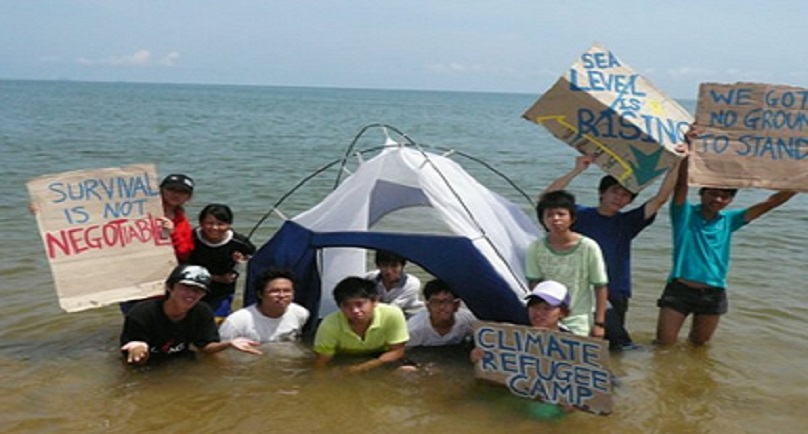by Juanita Nonwo – EM TV Online
Australia should be taking the lead in efforts to resettle climate change migrants who are forced to leave their homes across the Pacific.
This statement came after Australia’s opposition Immigration Spokesman, Richard Marles, visited Papua New Guinea, the Marshall Islands and Kiribati, observing the effects of climate change on these low-lying Pacific islands.
According to Marles, Australia’s annual net migration intake is more than 200,000 people – a huge figure compared to the combined population of Kiribati and Tuvalu together which is less than 120,000.
Marles said that Australia has more than enough capacity to aid Pacific Island nations. The opposition’s Immigration Spokesman stated that migration from Pacific islands affected by climate change will not start immediately, rather the focus at present is on these communities maintaining their homes, lives and culture.
“…currently they (Pacific nations) see the critical role for Australia as playing its part in reducing greenhouse emissions and in supporting them with adaptation efforts. But if climate change is placing the viability of communities in question, then inevitably some people will move as a result. So Australia being a destination for climate change migrants surely has to be up for discussion,” said Marles.
While all that is at hand, a new legal framework will need to be sorted out concerning the 1951 refugee convention, which defines what type of person can be granted the status as a refugee – apparently it doesn’t consider climate change migrants as such; which was the reason behind courts in New Zealand refusing to accept claims from a Kiribati man, Ioane Teitiota, as the first climate change refugee, consequently resulting in his deportation in September.
Nevertheless, there are options available to different Pacific islands, such as the Marshall Islands, who have the right to migrate to the United States; and Palau, Cook Islands, Fiji, Samoa, Tonga Tuvalu and the federated State of Micronesia who have legal rights to labour markets in New Zealand and the US.
However, not all Pacific nations have these opportunities available to them; such as the case for Kiribati, Nauru, Vanuatu, Solomon Islands and Papua New Guinea;
Being one of the most vulnerable nations to climate change and having 97 per cent of landmass that is less than five metres above sea level, Kiribati has taken the challenge of implementing a climate change migration program – Migration with Dignity.
Kiribati’s President, Anote Tong, explains that the program is designed to provide his people with education and vocational skills that will enable them to find jobs abroad when their atoll island is no longer capable of sustaining lives – as suggested by most projections.
“As one of the Pacific’s most prosperous countries, Australia must consider what role to play. Our capacity to assist Pacific citizens is unrivalled in terms of positive migration experiences. Being proactive instead of reactive on these issues will show this is an opportunity where Australia can help, and not in any way a threat,” commented a policy analyst from Migration Council Australia, Henry Sherrell.
Related articles:
Family Plead To Stay In New Zealand
Former East Timor President Welcomes Deported Kiribati Man
Former Kiribati President Say Kiribati Still an Island Home Despite Climate Change Effects


